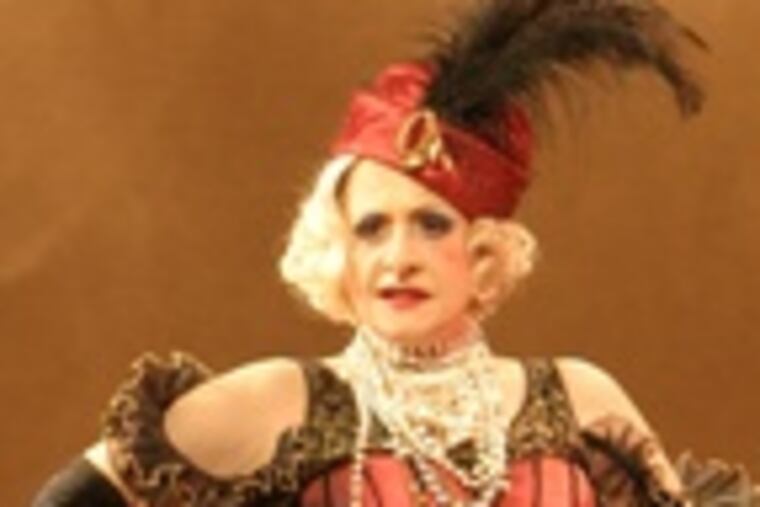'Mahagonny' provides some holiday relief
WHYY's broadcast of the Brecht/Weill opera is an antidote for all those Sugar Plum Fairies.

Attention all Brecht/Weill admirers, as well as any stray über-Grinches: Relief from saccharine holiday TV is upon us, thanks to a gutsy programming decision from PBS's
Great Performances
to air
The Rise and Fall of the City of Mahagonny
at 9 p.m. tomorrow on WHYY (Ch. 12) - just a week before Christmas.
Written in 1920s Berlin, partly in response to difficult economic circumstances that aided the rise of Nazism, the piece confronts inhumane mercantile ethics (just as we're all shopping ourselves to death) in a cynical, clinical parable about a Las Vegas-like town that's erected in the wake of the Alaska gold rush by those who believe it's easier to dig gold out of miners than out of the ground.
Written in the broadest possible strokes,
Mahagonny
is a ready receptacle for any number of moral issues hanging in the air at any given time. And in this Los Angeles Opera production by John Doyle, director of the revelatory Broadway revivals of
Sweeney Todd
and
Company
, the lowlifes of Act I start looking even more familiar in final scenes when one of the protagonists is on trial for the capital crime of running out of money. Jenny the prostitute, played by Audra MacDonald, suddenly appears in a business suit with a cell phone, resembling Condoleezza Rice; Fatty the (previously slovenly) Bookkeeper now is a uniformed Pentagon general.
Like the allusions or not (I did),
Mahagonny
always needs a strong directorial hand. Though its best-known music is in Act I (the "Alabama Song" was made famous by the Doors), the Kurt Weill score doesn't take on the musical substance of an opera until much later. Because librettist Bertolt Brecht
wasn't about to let any entertainment elements get in the way of his message moments, the piece sermonizes at length and repeatedly.
The team assembled by Los Angeles Opera is full of strengths: Michael Feingold's direct, sometimes colloquial English translation; James Conlon's spirited conducting, and director Doyle, who attempts to bolster the narrative thrust by continuously moving the story forward in history. Early scenes in the desert look like a film noir played out on the sets for the musical
110 in the Shade
; later scenes look like yesterday.
Along the way, the production grasps madly for wide-ranging imagery: Main Street Mahagonny is Route 666. McDonald wears a helmetlike Louise Brooks hairdo, sometimes under a cowboy hat. Though opera venues as large as L.A.'s can dwarf
Mahagonny
(Paris Opera solved that problem with a giant, neon cactus), the telecast's camerawork gives the imagery maximum impact.
Still, the narrative sags, sometimes badly, and some scenes near the end of Act I almost completely tank. Two things keep the opera moving: Almost every scene has some sort of visual "wow" moment, and the cast of savvy singing actors knows how to turn sermons into star turns.
Half from Broadway, half from opera, they're all miked so that Patti LuPone, who plays the town's founder and money handler with eloquent glowering and gum-chewing, can out-shout the hapless miner played by tenor Anthony Dean Griffey, who uses the amplification to project rhetorical detail usually heard from opera singers in small-hall recitals. As Jenny, McDonald has never been sexier (she's a yoga devotee, and it shows) and sings with darker vocal colors than ever.
One odd moment: After hours of having your skull hammered about the evils of commercialism, the singers take their bows amid a voice-over ad for the DVD version, which will be released Tuesday on EuroArts. If you've gotten that far in the telecast, don't turn it off. A from-the-vaults educational program about Weill hosted by Aaron Copland follows as a postscript. The composer's widow, Lotte Lenya, is on hand, singing magnetically.